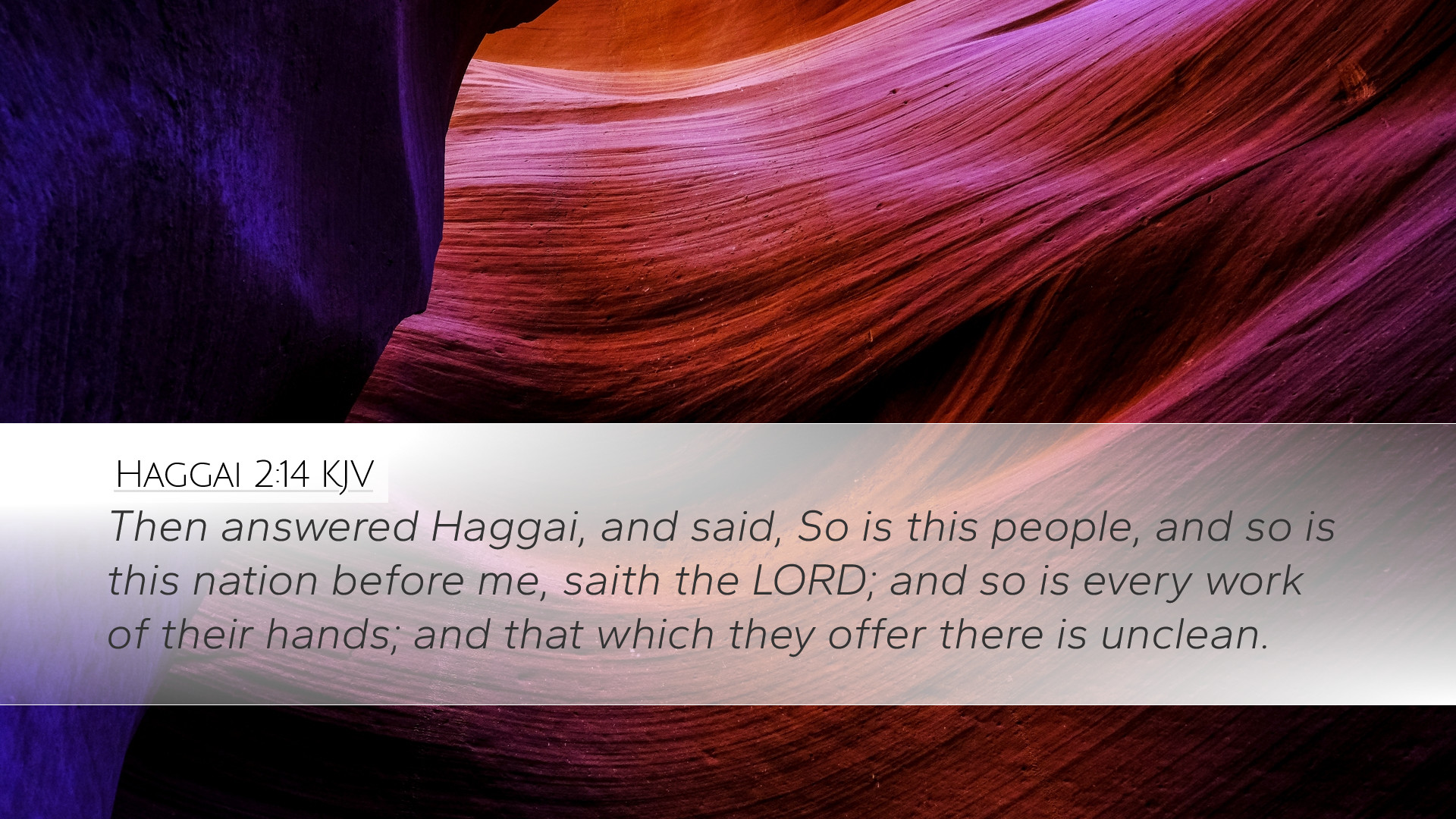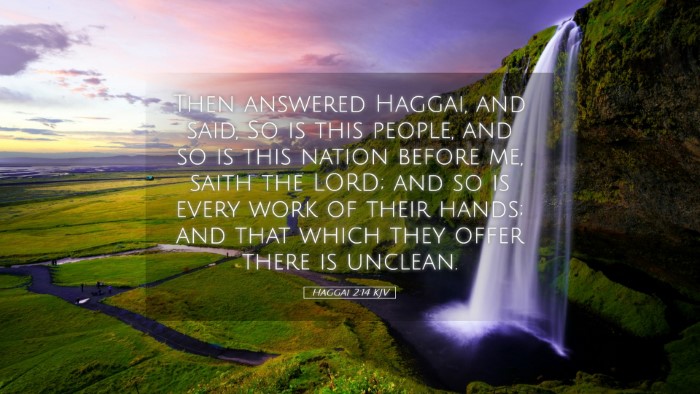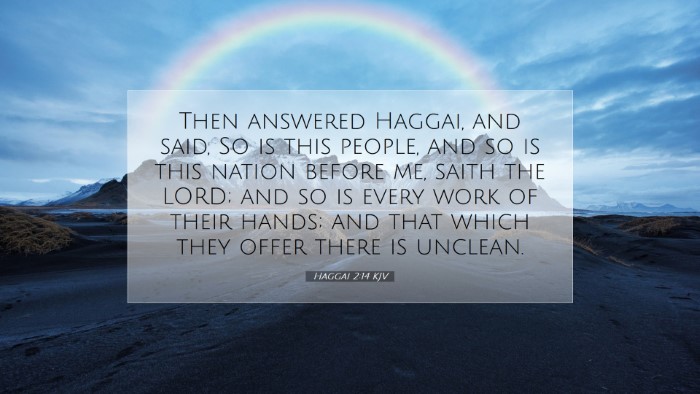Old Testament
Genesis Exodus Leviticus Numbers Deuteronomy Joshua Judges Ruth 1 Samuel 2 Samuel 1 Kings 2 Kings 1 Chronicles 2 Chronicles Ezra Nehemiah Esther Job Psalms Proverbs Ecclesiastes Song of Solomon Isaiah Jeremiah Lamentations Ezekiel Daniel Hosea Joel Amos Obadiah Jonah Micah Nahum Habakkuk Zephaniah Haggai Zechariah MalachiHaggai 2:14
Haggai 2:14 KJV
Then answered Haggai, and said, So is this people, and so is this nation before me, saith the LORD; and so is every work of their hands; and that which they offer there is unclean.
Haggai 2:14 Bible Commentary
Commentary on Haggai 2:14
In Haggai 2:14, we find a profound statement regarding the nature of holiness and defilement, particularly in relation to the people of Israel and their covenant with God. This verse reads:
"So is this people, and so is this nation before me, saith the Lord; and so is every work of their hands; and that which they offer there is unclean."
Contextual Background
The book of Haggai is set in the aftermath of the Babylonian exile, during a time when the people of Judah were returning to Jerusalem to rebuild the temple of the Lord. The prophet Haggai delivers a message from God to encourage and motivate the people to prioritize the rebuilding of the temple, understanding that their spiritual condition and commitment to God are intricately linked to their endeavors.
The Nature of Defilement
This verse offers a striking revelation about the defilement that can arise from sinfulness in the lives of God’s people. The broad application is significant:
- Identity of the People: Haggai emphasizes that the people of Israel, as well as their actions, are deemed unclean before the Lord due to their neglect of God's temple and commands.
- Holiness in Relation to Actions: Just as holiness can be imparted, defilement, as illustrated in this verse, operates on the contrary. The actions of the people—what they produce and how they worship—reflect their moral and spiritual state.
- Corporate Responsibility: The verse implies a collective culpability, suggesting that the state of one’s community can affect the spiritual standing of the entire nation.
Theological Insights
Theologically, this passage aligns with several key doctrines:
- Corruption of Sin: Matthew Henry posits that just as the works of the hands of this people are deemed unclean, so too are all works and endeavors that spring from a heart estranged from God. Sin's pervasive nature means it can contaminate not only the individual but the collective works of the people.
- Separation for Worship: Albert Barnes elucidates that God has established a system where His holiness cannot dwell alongside unclean practices; thus, offerings made in a defiled state do not please Him.
- Call to Repentance: This declaration serves as a call to repentance—a recognition that the people are to reorient their priorities, bringing their hearts and works back in alignment with God’s will.
Haggai's Exhortation to Action
Haggai's message is clear: there needs to be a restoration of covenant fidelity and commitment to God’s instructions. Adam Clarke thoughtfully comments on how the rebuilding of the temple signifies not just a physical reconstruction but a reestablishment of God’s presence among His people.
The act of offering becomes significant within this framework. God is not merely concerned with the physical offerings brought to the temple; He desires an inner purity and commitment from those who present their gifts. Therefore, the metaphor of defilement highlights the need for inner transformation.
Practical Applications for Today
The relevance of this passage extends beyond ancient Israel and speaks to contemporary believers:
- Self-Examination: Believers today are encouraged to examine their lives and consider areas where they may be inadvertently living in disobedience or neglecting God’s call, particularly regarding their sacrifices and offerings.
- Community Awareness: The implications of corporate holiness remind us that our collective engagement in sin can have broader repercussions. Churches and ministries must encourage accountability and holiness both individually and communally.
- Priority of Worship: In a culture which often prioritizes work and success over spiritual devotion, this passage serves as a reminder to place our spiritual responsibilities above our material pursuits, assuring that our endeavors align with God’s desires.
Conclusion
Haggai 2:14 poignantly articulates the connection between holiness and the human experience of worship and work. The call to return, to prioritize God in the rebuilding of the temple, and to ensure that no defilement persists in the offering of their lives and labors remains a timeless directive for all who seek to walk faithfully with the Lord.
In conclusion, the insights from public domain commentaries deepen our understanding of this critical verse, providing a rich tapestry of theological reflection and practical application for students, pastors, and theologians alike.


